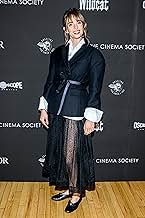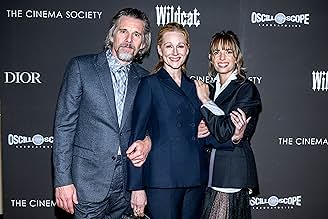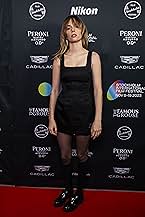IMDb RATING
5.8/10
1.5K
YOUR RATING
Follows the life of writer Flannery O'Connor while she was struggling to publish her first novel.Follows the life of writer Flannery O'Connor while she was struggling to publish her first novel.Follows the life of writer Flannery O'Connor while she was struggling to publish her first novel.
- Awards
- 1 nomination total
Laketa Caston
- Sullen Woman
- (as Laketa Caston-Hosey)
- Director
- Writers
- All cast & crew
- Production, box office & more at IMDbPro
Featured reviews
WILDCAT, based on the stories of Flannery O'Connor, was even worse than my worst fears! Flannery O'Connor is one of my favorite writers, so I was thrilled that somebody was making a movie of her short stories. Previous attempts to film her work have yielded mixed results. (The best was WISE BLOOD with Brad Dourif and Harry Dean Stanton; most notorious was the TV version of "The Life You Save May Be Your Own" with Gene Kelly and a tacked-on happy ending.) This one takes on O'Connor's life after she has been diagnosed with Lupus (the disease that killed her father) and is frantically trying to write her very best before her death at age 39. Interspersed with the biographical episodes are vignettes from some of her short stories, which make no sense when removed from their contexts. It's an incomprehensible mess (starting with the title-there are no wildcats in O'Connor's work and she, a fanatical Catholic girl, could hardly be called one), with the same actors portraying real people Flannery knew and the characters she based on them. If you are not familiar with O'Connor and her work, I doubt this will make any sense at all. Top it off with the cringeworthy attempts at Southern accents by most of the actors. I enjoyed a few moments of it, but that's primarily because I had a frame of reference. Flannery's fans tend to be very possessive of her. I am no exception. I thought this was heartbreakingly bad.
I saw WILDCAT on May 19th, 2024. This was at Cinema Arts Centre in Huntington, New York. The audience stayed for the entirety of the end credits. Only I do that. I think this means that this was an audience of readers. Flannery O'Connor was the draw.
WILDCAT tells a little about the life of the author of the novel WISEBLOOD. I know Flannery O'Connor's reputation: She was the ultimate Iowa Writers Workshop figure; she was a serious Catholic from the deeply Protestant deep South; and she wrote the greatest short story ever written by an American, "A Good Man Is Hard To Find."
The movie will best be understood in comparison to other movies of the last thirty or so years dealing with the lives of creative people. Frida Kahlo, Jackson Pollack and Thomas Wolfe have been subjects of films. FRIDA was stunning, but it had, in common with most relatively recent cinematic treatments of the lives of artists, the goal of pointing the audience to the works the subjects created. Frida Kahlo, like Herman Melville, suddenly caught the world's attention decades after death. Pollack was very famous in his lifetime and his work is never out of fashion. Thomas Wolfe remains a colorful author nobody has much patience for; the movie is focused solely on his working relationship with the great American editor, Maxwell Perkins. Wolfe, the historical figure, remains recognizable to people who love books. But nobody loves his books. (Well, nobody I love does.)
WILDCAT is Ethan Hawke's entry into this field. I started reading WISEBLOOD once. I read three of O'Connor's stories and I've read a fair number of HARPER'S BAZAAR and/or ATLANTIC MONTHLY articles about her. I've seen her mentioned in many a discursion in THE NEW YORK TIMES BOOK REVIEW. I almost borrowed THE VIOLENT BEAR IT AWAY today. But I put it back on the shelf after reading half of the first paragraph. Someone had borrowed WISEBLOOD, and O'Connor's story collections are due back at the library in a few weeks. People are reading her right now. I decided to let someone else's eyes rest on THE VIOLENT BEAR IT AWAY.
I enjoyed the movie thoroughly. I was the only person in that audience of Flannery O'Connor fans (or industry insiders) who allowed himself to be heard laughing at the funny parts. O'Connor's sardonic humor is much more prominent than that Sacred Heart stuff she made so terrifying. The movie weaves actual conversations from O'Connor's life with scenes from her fiction, and many characters from her life are played by the same actors acting out the short stories. What I found really intriguing was that the movies presented PARTS of stories. (I have pointed out I have read three of her stories, but I'm certain that all the ones adapted here are treated in part. The opening of the movie is from one of the stories I read. Ethan Hawke wants to pique our interest in O'Connor's work, and he shows us a Flannery O'Connor who adapts what she experiences or witnesses. O'Conner's mother, played by Laura Linney, crops up in different guises in the stories, as does O'Connor herself.
Ethan Hawke's movie features his daughter - Maya Hawke is a first-rate actress, by the way - playing a woman who puts herself and her mother in her fiction. Years and years ago, when Ethan Hawke was in his early twenties, he published a book, and I remember the skepticsim with which this was met. But he consistently emphasizes a life of reading; of play-going and, I would say, salvation through the written word. Put him in a category with the Wyeths; Lloyd Bridges and his family; or the Wainwright and McGarrigle families. There is a tradition of creative families and Ethan Hawke's is one of these. Nobody else was going to offer a sincere treatment of the literary art of the short-lived, uncompromising author at the center of WILDCAT. Nobody else wanted to show the legacy Flannery O'Connor left the reading public.
Knowing some little about O'Connor or her writing will help you enjoy WILDCAT. But you might see it and then seek out her books.
WILDCAT tells a little about the life of the author of the novel WISEBLOOD. I know Flannery O'Connor's reputation: She was the ultimate Iowa Writers Workshop figure; she was a serious Catholic from the deeply Protestant deep South; and she wrote the greatest short story ever written by an American, "A Good Man Is Hard To Find."
The movie will best be understood in comparison to other movies of the last thirty or so years dealing with the lives of creative people. Frida Kahlo, Jackson Pollack and Thomas Wolfe have been subjects of films. FRIDA was stunning, but it had, in common with most relatively recent cinematic treatments of the lives of artists, the goal of pointing the audience to the works the subjects created. Frida Kahlo, like Herman Melville, suddenly caught the world's attention decades after death. Pollack was very famous in his lifetime and his work is never out of fashion. Thomas Wolfe remains a colorful author nobody has much patience for; the movie is focused solely on his working relationship with the great American editor, Maxwell Perkins. Wolfe, the historical figure, remains recognizable to people who love books. But nobody loves his books. (Well, nobody I love does.)
WILDCAT is Ethan Hawke's entry into this field. I started reading WISEBLOOD once. I read three of O'Connor's stories and I've read a fair number of HARPER'S BAZAAR and/or ATLANTIC MONTHLY articles about her. I've seen her mentioned in many a discursion in THE NEW YORK TIMES BOOK REVIEW. I almost borrowed THE VIOLENT BEAR IT AWAY today. But I put it back on the shelf after reading half of the first paragraph. Someone had borrowed WISEBLOOD, and O'Connor's story collections are due back at the library in a few weeks. People are reading her right now. I decided to let someone else's eyes rest on THE VIOLENT BEAR IT AWAY.
I enjoyed the movie thoroughly. I was the only person in that audience of Flannery O'Connor fans (or industry insiders) who allowed himself to be heard laughing at the funny parts. O'Connor's sardonic humor is much more prominent than that Sacred Heart stuff she made so terrifying. The movie weaves actual conversations from O'Connor's life with scenes from her fiction, and many characters from her life are played by the same actors acting out the short stories. What I found really intriguing was that the movies presented PARTS of stories. (I have pointed out I have read three of her stories, but I'm certain that all the ones adapted here are treated in part. The opening of the movie is from one of the stories I read. Ethan Hawke wants to pique our interest in O'Connor's work, and he shows us a Flannery O'Connor who adapts what she experiences or witnesses. O'Conner's mother, played by Laura Linney, crops up in different guises in the stories, as does O'Connor herself.
Ethan Hawke's movie features his daughter - Maya Hawke is a first-rate actress, by the way - playing a woman who puts herself and her mother in her fiction. Years and years ago, when Ethan Hawke was in his early twenties, he published a book, and I remember the skepticsim with which this was met. But he consistently emphasizes a life of reading; of play-going and, I would say, salvation through the written word. Put him in a category with the Wyeths; Lloyd Bridges and his family; or the Wainwright and McGarrigle families. There is a tradition of creative families and Ethan Hawke's is one of these. Nobody else was going to offer a sincere treatment of the literary art of the short-lived, uncompromising author at the center of WILDCAT. Nobody else wanted to show the legacy Flannery O'Connor left the reading public.
Knowing some little about O'Connor or her writing will help you enjoy WILDCAT. But you might see it and then seek out her books.
Wildcat (2023) directed by Ethan Hawke is an attempt on creating a portrait of auguished writer, Flannery O'Connor. The lead actress, Maya Hawke (daughter of Ethan Hawke/Uma Thurman) takes a huge leap to portray the Lupus illed short fiction writer.
There are quiet, dreamlike moments in this film, giving insight to race and class through the writers and the Southern scenes. There's playful scenes of intertwining O'Connor's short stories with historical facts.
At the end, the scenery filmed in Kentucky, carries a strong narrative with a decent soundtrack, hoping to bring it to the finish line. The film become a little lost -- not knowing if it goes on a religious or spiritual route on O'Connor story or take a hard look at racism and class in the southern intellectual culture.
It's ending, shows an the tortured health of the writer continues and does the writing without knowing life's complexity, a maybe tribunal nod to the Catholic devout O'Connor.
There are quiet, dreamlike moments in this film, giving insight to race and class through the writers and the Southern scenes. There's playful scenes of intertwining O'Connor's short stories with historical facts.
At the end, the scenery filmed in Kentucky, carries a strong narrative with a decent soundtrack, hoping to bring it to the finish line. The film become a little lost -- not knowing if it goes on a religious or spiritual route on O'Connor story or take a hard look at racism and class in the southern intellectual culture.
It's ending, shows an the tortured health of the writer continues and does the writing without knowing life's complexity, a maybe tribunal nod to the Catholic devout O'Connor.
It appears that a lot of people have left poor ratings for this film without leaving a review to say why. Perhaps they are encountering Flannery for the first time and the shock was too much. I saw this film last night and thought it was wonderful. The script artfully mixes together scenes from what is known of Flannery's life, entries from her prayer journal, and brief reenactments of five of her stories (The Life You Save May Be Your Own, Revelation, Parker's Back, Everything That Rises Must Converge, and Good Country People). Bravo to Maya Hawke, she is a tour de force, appearing as Flannery and in all five of the stories. Strong support from Laura Linney and the rest of the cast. I'm looking forward to a re-watching sometime, hoping to catch things I missed.
Wildcat is the story of Flannery O'Connor (Maya Hawke), a Southern Catholic writer who lived from 1925 to 1964 and was disabled by Lupus in her later years. Although the movie shows O'Connor traveling to Iowa and New York to further her writing career, most of the plot takes place in her family's home as she types away on multiple drafts of her stories while the disease takes its toll. O'Connor is shown as socially awkward, and her mother and others cannot comprehend the motivations for her fiction. Possessing a strong faith, she explores the bizarre and twisted ways in which people can be affected by religion.
Interspersed with slow-moving scenes of O'Connor's life (non-chronological) are scenes from her fiction, acted out by the same cast of characters. Where the real segues into the fictional is sometimes hard to discern. The fictional scenes provide some insight into O'Connor's mindset but, having not read her writing in many years, I was hoping for even more insight into the influences on her writing (I probably hoped for too much). The movie is a portrait of a troubled soul that will interest her devoted readers and perhaps entice others to sample her offbeat fiction.
Interspersed with slow-moving scenes of O'Connor's life (non-chronological) are scenes from her fiction, acted out by the same cast of characters. Where the real segues into the fictional is sometimes hard to discern. The fictional scenes provide some insight into O'Connor's mindset but, having not read her writing in many years, I was hoping for even more insight into the influences on her writing (I probably hoped for too much). The movie is a portrait of a troubled soul that will interest her devoted readers and perhaps entice others to sample her offbeat fiction.
Did you know
- TriviaDirector and co-writer Ethan Hawke first became interested in the works of Flannery O'Connor in his early teens, when he and his mother lived in Atlanta, Georgia and his mother worked selling textbooks to local colleges. Hawke read so much of O'Connor's works that he assumed she was as well known outside of his household as Abraham Lincoln.
- GoofsMany of the scenes throughout the movie are set in fall or winter, yet blackberries are mentioned in one sequence, and in another, there are animated fireflies-neither of these things are possible in a Georgia autumn or winter.
- Quotes
Flannery O'Connor: If it is a symbol to hell with it. What people don't understand is how much religion costs. They think its easy. They think electric blanket and there it is the cross.
- SoundtracksThe Darkest Hour
performed by Norman Dane
- How long is Wildcat?Powered by Alexa
Details
Box office
- Budget
- $10,700,000 (estimated)
- Gross US & Canada
- $563,591
- Opening weekend US & Canada
- $58,140
- May 5, 2024
- Gross worldwide
- $563,591
- Runtime1 hour 43 minutes
- Color
Contribute to this page
Suggest an edit or add missing content








































